
The Control Yuan is the supervisory and auditory branch of the government of the Republic of China (Taiwan).
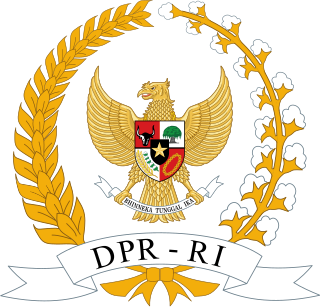
The People's Representative Council of the Republic of Indonesia, also known as the House of Representatives, is one of two elected chambers of the People's Consultative Assembly (MPR), the national legislature of Indonesia. It is considered the lower house, while the Regional Representative Council (DPD) serve as the upper house; while the Indonesian constitution does not explicitly mention the divide, the DPR enjoys more power, privilege, and prestige compared to the DPD.

The Constitution of the Italian Republic was enacted by the Constituent Assembly on 22 December 1947, with 453 votes in favour and 62 against. The text, which has since been amended sixteen times, was promulgated in an extraordinary edition of Gazzetta Ufficiale on 27 December 1947. The Constituent Assembly was elected by universal suffrage on 2 June 1946, on the same day as the referendum on the abolition of the monarchy was held, and it was formed by the representatives of all the anti-fascist forces that contributed to the defeat of Nazi and Fascist forces during the Italian Civil War. The election was held in all Italian provinces. The Constitution was drafted in 1946 and came into force on 1 January 1948, one century after the Constitution of the Kingdom of Italy, the Statuto Albertino, had been enacted.
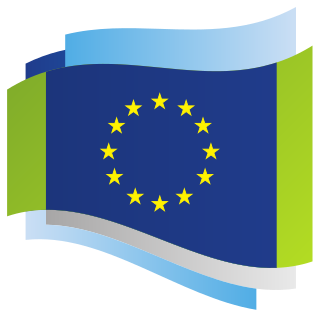
The European Defence Agency (EDA) is an agency of the European Union (EU) that promotes and facilitates integration between member states within the EU's Common Security and Defence Policy (CSDP). The EDA is headed by the High Representative (HR/VP), and reports to the Council. The EDA was established on 12 July 2004 and is based in the Kortenberg building in Brussels, Belgium, along with a number of other CSDP bodies.
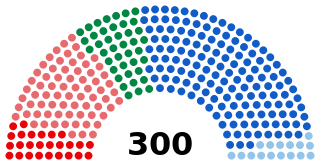
The Hellenic Parliament or Greek Parliament, formally known as the Parliament of the Hellenes and also known as the Hellenic Bouleterion, is the unicameral legislature of Greece, located in the Old Royal Palace, overlooking Syntagma Square in Athens. The parliament is the supreme democratic institution that represents the citizens through an elected body of Members of Parliament (MPs).
The Central Bank of the Republic of San Marino (CBSM), is the central bank of San Marino.

The Chamber of Representatives is one of the two chambers in the bicameral Federal Parliament of Belgium, the other being the Senate. It is considered to be the "lower house" of the Federal Parliament.

The committees of the European Parliament are designed to aid the European Commission in initiating legislation.

In the European Union, the Conference of Presidents is a governing body of the European Parliament. The body is responsible for the organisation of Parliament, its administrative matters and agenda.

The Chairman of the State Duma of the Federal Assembly of the Russian Federation, also called Speaker (спикер), is the presiding officer of the lower house of the Russian parliament. It is the fourth highest position, after the President, the Prime Minister and the Chairman of the Federation Council, in the government of Russia. His responsibilities include overseeing the day-to-day business of the State Duma, presiding and maintaining order at the regular sessions of the parliament. The Speaker also chairs the Council of the Duma which includes representatives from all the parliamentary parties and determines the legislative agenda.

The Ministry of Defence (MoD) is charged with coordinating and supervising all agencies and functions of the government relating directly to national security and the Indian Armed Forces. The President of India is the ceremonial commander-in-chief of the armed forces of the country. The Ministry of Defence provides policy framework and resources to the armed forces to discharge their responsibility in the context of the defence of the country. The Indian Armed Forces and Indian Coast Guard under the Ministry of Defence are primarily responsible for ensuring the territorial integrity of India.
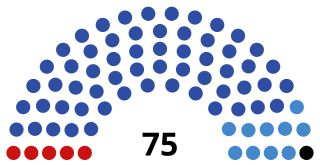
The State Council of Crimea is the parliament of Russian administered Republic of Crimea. It claims to be a continuation of the 'Supreme Council of Crimea' following a vote by the Ukrainian parliament to dissolve the Supreme Council of Crimea. The Parliament is housed in the Parliament building in the centre of Simferopol.
The Bureau of the European Parliament is responsible for matters relating to the budget, administration, organisation and staff. It is composed of the President of the European Parliament along with all 14 Vice-Presidents and the five Quaestors. They are elected for two and a half years with the President holding a casting vote. Elections are usually held at the start, and at the midpoint, of each Parliamentary term.
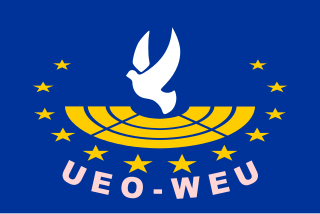
The Assembly of the Western European Union, also called the European Security and Defence Assembly, was a parliamentary assembly for delegations from the national parliaments of the member countries of the Western European Union (WEU), a security and defence organisation. Its final session was on 10 May 2011.
Government of Republika Srpska is the executive authority of Republika Srpska, along with the President of Republika Srpska. The Prime Minister is head of the Government, while the Government is composed of his deputies and ministers. The powers of the Government are determined by the Constitution of Republika Srpska. The Government is appointed by the National Assembly for a four-year term.
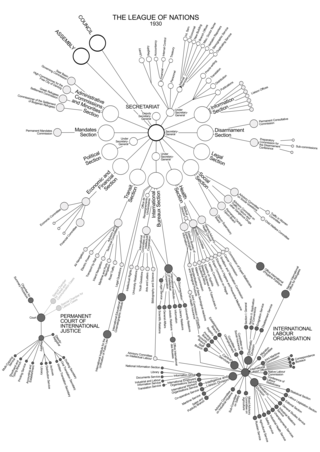
The League of Nations was established with three main constitutional organs: the Assembly; the Council; the Permanent Secretariat. The two essential wings of the League were the Permanent Court of International Justice and the International Labour Organization.

The Office of the Comptroller and Auditor General of Bangladesh (C&AG) is the Supreme Audit Institution (SAI) of the country. Like the SAIs in many other countries across the world the institution is established by the Constitution of Bangladesh. This institute is responsible for maintaining accounts of the republic and audits all receipts and expenditure of the Government of Bangladesh, including those of bodies and authorities substantially financed by the government. The reports of the CAG are discussed by the Public Accounts Committee, which is a standing committee in the Parliament of Bangladesh.

The National People's Congress (NPC) is the national legislature of the People's Republic of China. With 2,977 members in 2023, it is the largest legislative body in the world. The NPC is elected for a term of five years. It holds annual sessions every spring, usually lasting from 10 to 14 days, in the Great Hall of the People on the west side of Tiananmen Square in Beijing.

The Bureaus of the Cortes Generales are the governing bodies of each House of the Cortes Generales, the legislative branch of Spain. The Bureaus are made up of the President or Speaker of the House, the Vice Presidents or Deputy Speakers and the Secretaries. Each Bureau is autonomously regulated by the standing orders of its House and its composition its not the same.

















